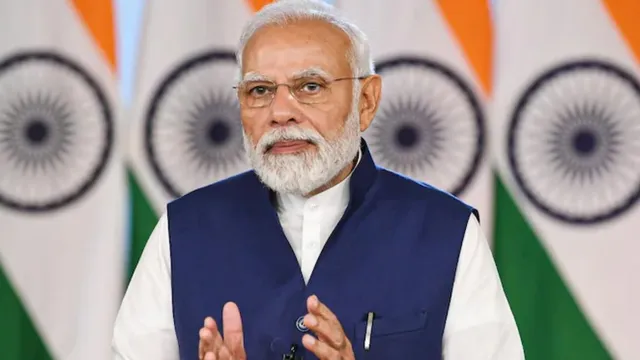- By News Desk
- Tue, 16 Sep 2025 06:44 PM (IST)
- Source:JND
PM Modi 75th Birthday: India’s governance landscape has undergone a striking transformation over the past eleven years under Prime Minister Narendra Modi. What was once seen as an era of unfulfilled promises has shifted to one of measurable outcomes and delivery-driven governance. From the early pledge of “Na Khaunga, Na Khane Dunga” signalling zero tolerance for corruption to the guiding principle of “Sabka Saath, Sabka Vikas, Sabka Vishwas, Sabka Prayas,” PM Narendra Modi positioned his leadership on trust, inclusivity, and accountability.
Restoring Trust in Politics
Across the past eleven years, faith in politics has been restored. His line from the Red Fort “We Walk Together, We Move Together And Together We Take This Country Forward” became the principle for real change. After years in which trust in the system was eroded by undelivered promises, he forged a new social contract. The first years were all about aspirations’ bringing banks to the unbanked, building toilets and driving the Swachh Bharat Mission.
One shining example is sanitation. Over 12 crore toilets have been built under his term, giving dignity and safety to millions. By 2019, the government shifted gears to deliver solid homes, healthcare with Ayushman Bharat, and wellness centres; no longer just plans on paper. Now, post-2024, India’s vision is laser-focused on Viksit Bharat by 2047, a fully developed nation by its 100th Independence anniversary. Suddenly, politics feels dependable again. Its more than talk, it’s a contract fulfilled with every step.
Big Promises, Big Delivery
Jan Dhan Yojana brought banking to the doorstep of the forgotten Indian. Previously, opening a bank account was an ordeal that excluded the poor. Now, over 56 crore accounts have bridged that gap. It was easy for a young man in a Maharashtra village to deposit his first wages, or an elderly woman in Bengal to receive her pension directly. Farmers went from rationing irrigation and accepting crop loss to planning harvests with confidence. Kids could study after sundown due to electricity. For the first time in decades, people felt the system was working for them, not against them.
ALSO READ: PM Modi At 75: Landmark Reforms That Reshaped India’s Governance, Economy And Diplomacy
Promises didn’t stop there. When PM Modi committed to “One Rank, One Pension” for the armed forces, he ended a debate that had lingered for decades. Retired soldiers, long denied parity in pensions, saw their sacrifice and service honoured with cheques in hand, not just words.
Ayushman Bharat, a massive leap in health security, handed out over 41 crore health cards; more than 9 crore hospital stays have been covered, rescuing families from catastrophic medical debt and offering real economic equity. Health reforms like Ayushman Bharat didn’t just promise, they delivered, as real people such as vegetable vendors, migrant labourers, teachers accessed modern healthcare for the first time.
Back in Gujarat, before the entire nation watched his every move, PM Modi launched the Jyotigram Yojana. Rural Gujarat, once known for darkness after sunset, suddenly saw the lights come on literally. By 2006, 95% of Gujarat’s villages were endowed with reliable electricity, not just for homes but for schools, clinics, and businesses.
ALSO READ: PM Modi At 75: How His Enduring Legacy Became A Blueprint For India’s Future Generations
At each milestone, be it Jyotigram, Swachh Bharat, Jan Dhan, Ayushman Bharat, Jal Jeevan Mission, India’s journey from “said” to “done” comes down to the compelling sight of a country finally keeping its word. For many, looking back on these changes is more than policy analysis. It’s the memory of a home lit for the first time, a mother who feels safe, a soldier who feels respected, a child who can drink tap water, and a nation that, perhaps for the first time, believes in the endurance of a promise.

